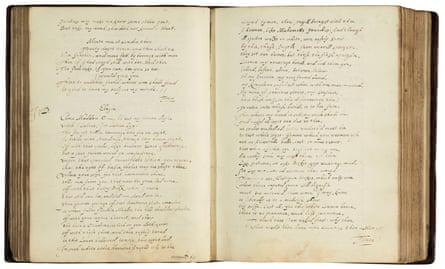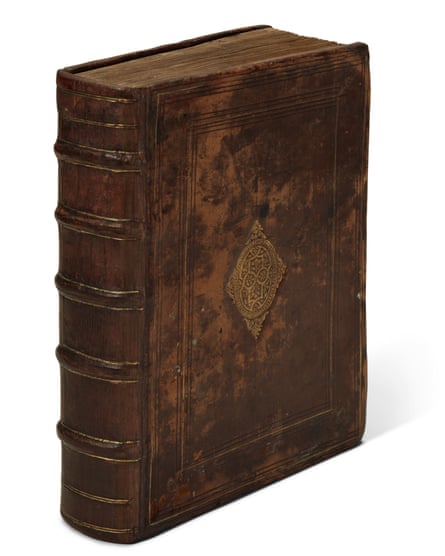A previously unrecorded handwritten manuscript of John Donne’s poetry has been found in a box at an English country house in Suffolk.
Dating back 400 years, the bound collection was kept for at least the last two centuries at Melford Hall in Suffolk. Sotheby’s expert Dr Gabriel Heaton was on a “standard checking visit” to the property when he found it in a box with other papers.
“Nobody knew about it … It was tucked away in a corner, collected with loose archival material around the house and not identified as being by Donne,” said Heaton. “I opened the box and came across this astonishing manuscript, opened it up and thought, ‘Hang on, that poem’s by John Donne … hang on, that’s also John Donne,’ and quite quickly realised it was a very very special and significant manuscript. It was a wonderful and exciting moment.”

Donne, the 17th-century priest and author of some of the English language’s most enduring poetry, from the Holy Sonnets to his love poems, was described by Ben Jonson as “the first poet in the World in some things”. But his work was, with a few exceptions, not available in print during his lifetime; Donne preferred it to be circulated among what Sotheby’s called an “exclusive coterie”, in written form.
“Some of Donne’s poems are very erotic … Later in his life when he’s dean of St Paul’s you can see why he might not want racy poems circulating,” said Heaton. The newly discovered manuscript, he added, was “almost certainly put together during Donne’s lifetime. Fairly shortly after his death his poems were printed and once there were printed editions, the market for a manuscript collection like this disappeared.”
The Melford manuscript is one of the largest contemporary collections of Donne’s poetry to survive, and the only one of its kind remaining in private hands, according to Sotheby’s, which is offering it for an estimate of £200,000 to £300,000. Around 30 other scribal manuscripts contain Donne’s poetry, but “only a tiny handful, maybe three or four others”, feature as much poetry as the one found in Melford Hall, which contains 139 poems by Donne, from The Sun Rising to The Flea.

“It covers pretty much every genre that he was writing poetry in. There’s religious verse as well as epigrams, love lyrics, verse epistles. It’s one of the greatest collections of manuscripts by Donne,” said Heaton.
Little is known about the scribe who copied out the poems. They are likely to have been a legal clerk or similar professional, said Heaton, with the hand “very attractive, very legible to modern readers”.
But it’s not the completely impersonal hand of a professional medieval scribe, he added. “You can see it looks like it gets more hurried as you go through the manuscript – perhaps for understandable reasons when you’ve got this quantity of material to be copied. It starts to slant more to the right. It is still very carefully formed but there are signs of individuality there.”
A second hand has corrected the text throughout the volume, with extra poems by different authors added by new owners over time, including a series of six poems that are otherwise unrecorded. The original version of Donne’s poem The Bracelet, in the manuscript entitled Elegie, has the phrase “fantastique scenes” corrected to “fantastique schemes”. Elsewhere, the reviser “introduced non-canonical readings”, said Sotheby’s, including a revision of The Storm, where “some coffind in theire cabbins lie; equallie” is changed to “some lie in cabbins coffind; equallie”.
“Whoever was correcting really knew the poems,” said Heaton. “Almost certainly, what happened was that the manuscript was bound blank and then the Donne poems were copied into it, and filled about half the volume. Then a lot of additional material has been added, including a group of otherwise unknown poems, probably written by the very early owner of the manuscript. But we don’t know for sure. There are all sorts of tantalising hints in the manuscript about its early history.”
In 2017, an early manuscript by Donne – which included a scandalous academic joke that could have caused him trouble – was discovered in a trunk in the archives of Westminster Abbey.

Comments (…)
Sign in or create your Guardian account to join the discussion